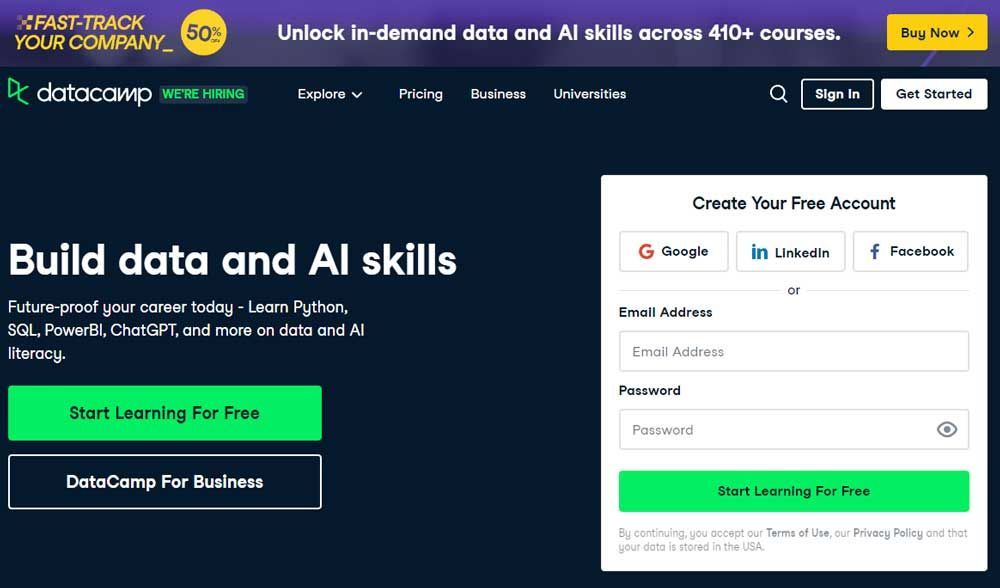DataCamp Review for 2023
Author: Ignas Varkala
Some of the links on this page may link to our affiliates. Learn more about our affiliate policies.
Last Updated: May 7, 2023
As a marketing professional with experience in various data analysis and programmatic projects, I've had the opportunity to explore numerous online learning platforms in my quest to expand my skills. In this comprehensive guide, I'll share my experiences and insights into DataCamp, a popular data science and analytics education platform that has played a significant role in my ongoing development.
At DataCamp, I embarked on the Data Analyst with Python Certification journey, where I delved into essential data manipulation and visualization techniques using Python libraries like pandas and matplotlib. This experience allowed me to hone my analytical skills, preparing me for real-world challenges in the data realm.
Not one to rest on my laurels, I continued to the Python Programmer and Data Engineer with Python certifications. These courses gave me an in-depth understanding of Python programming, including advanced concepts like object-oriented programming and web scraping. As a data engineer in training, I also explored crucial topics such as data wrangling, ETL processes, and working with databases.
I was confident in my newfound expertise and tested my Python prowess by taking the Python Programming Knowledge Assessment Quiz. To my delight, I scored in the 96th percentile, which deems my Python knowledge "Advanced." This achievement reinforced my belief in the effectiveness of DataCamp's learning approach and motivated me to pursue data mastery.
In summary, my journey with DataCamp has been both challenging and rewarding. It has equipped me with valuable skills and knowledge to apply directly to data analysis and machine learning projects. If you're considering DataCamp as a learning platform for yourself or your team, I hope my experiences can serve as a helpful guide in your decision-making process.
Introduction to DataCamp
DataCamp is an online platform that teaches data science, machine learning, and analytics using popular programming languages like R, Python, and SQL. Their mission is to make data fluency accessible to everyone, regardless of background or skill level.
Overview and mission
DataCamp offers various courses, projects, and challenges to help learners build practical data analysis, visualization, and modeling skills. With over 350 courses and a user base of more than 7 million learners, DataCamp has established itself as a leading platform for data education.
Platform features and user experience
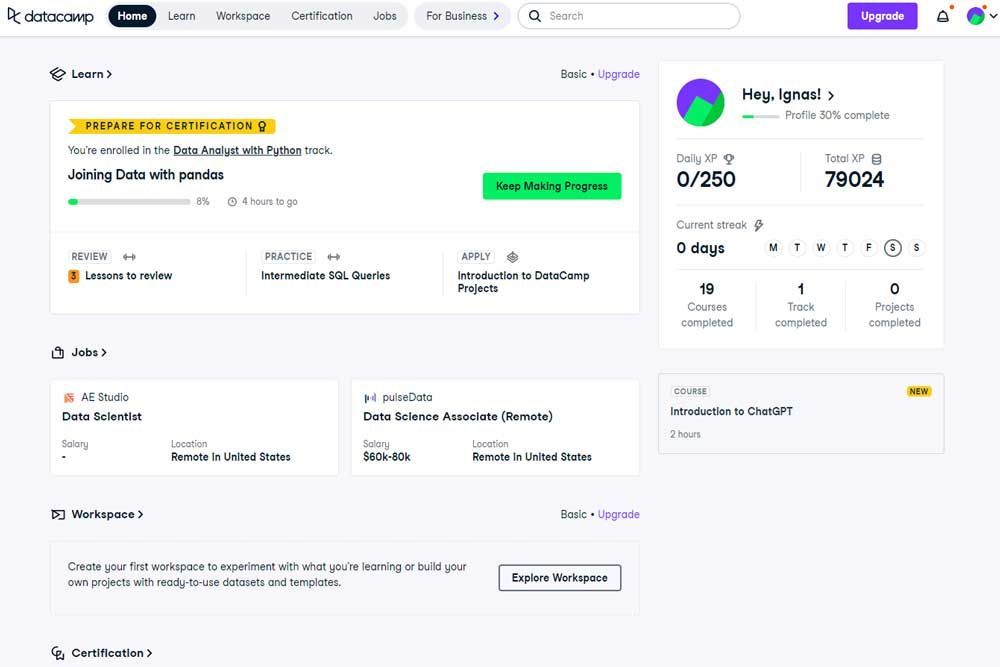
One of the things I appreciate most about DataCamp is its user-friendly interface and well-organized content. The platform makes it easy to find and enroll in courses, track progress, and access additional resources. In addition, each course is broken down into small, digestible units, enabling learners to build their skills and knowledge gradually.
Interactive and engaging learning
DataCamp's courses are designed to be interactive and engaging, focusing on hands-on learning. The platform uses a combination of video lectures, interactive coding exercises, and real-world projects to help learners apply their knowledge in practical contexts. This approach has helped me better understand the concepts and techniques I've learned, and I am confident to apply them in my projects.
Experienced experts and instructors
DataCamp's course content is developed by experienced professionals, developers, and educators with expertise in various programming languages, technologies, and industries. I've found the instructors to be knowledgeable and skilled at explaining complex concepts in a clear and approachable manner. Their guidance has been invaluable in helping me deepen my understanding of data science and improve my practical skills.
Community support and networking opportunities
Another valuable aspect of DataCamp is its vibrant community of learners and professionals. Through the platform's forums, social media channels, and networking events, I've had the opportunity to connect with like-minded individuals, exchange ideas, and seek support when facing challenges in my learning journey. This community has been a great source of inspiration and motivation for me, and it's a key factor in DataCamp's success as an
online learning platform.
DataCamp Courses and Programs
During my time with DataCamp, I've had the opportunity to explore a variety of their courses and programs. In this section, I'll discuss some of the platform's popular learning paths and offerings, including the Data Analyst, Data Scientist, and Python Programmer tracks and their certification programs and options for businesses and classrooms.
Data Analyst
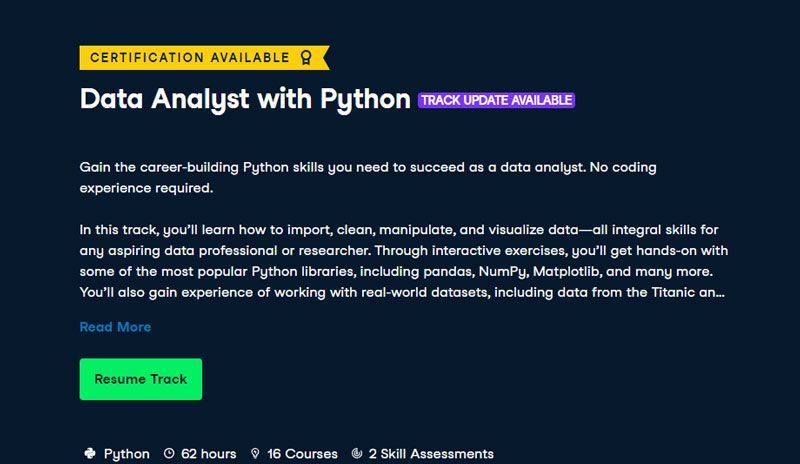
The Data Analyst track is designed for learners seeking data analysis, visualization, and reporting skills using popular tools like R, Python, and SQL.
Course structure and content
The Data Analyst track is divided into several courses, each focusing on a specific aspect of data analysis, such as data manipulation, visualization, or statistical analysis. The courses are designed to build on one another, starting with fundamental concepts and gradually progressing to more advanced topics. Throughout the courses, I found the balance between theory and practice effective, with plenty of opportunities to apply the concepts I learned in real-world scenarios.
Financing options
DataCamp offers a subscription-based pricing model with monthly or annual plan options. Like other tracks on the platform, the Data Analyst track is included in the subscription so learners can access all the courses and materials without additional cost.
Prerequisites and getting started
The Data Analyst track is beginner-friendly and does not require any prior experience in programming or data analysis. However, some basic knowledge of statistics and mathematics may be helpful. Thanks to the platform's interactive nature and the instructors' clear guidance, I found it easy to dive right into the courses.
Data Scientist
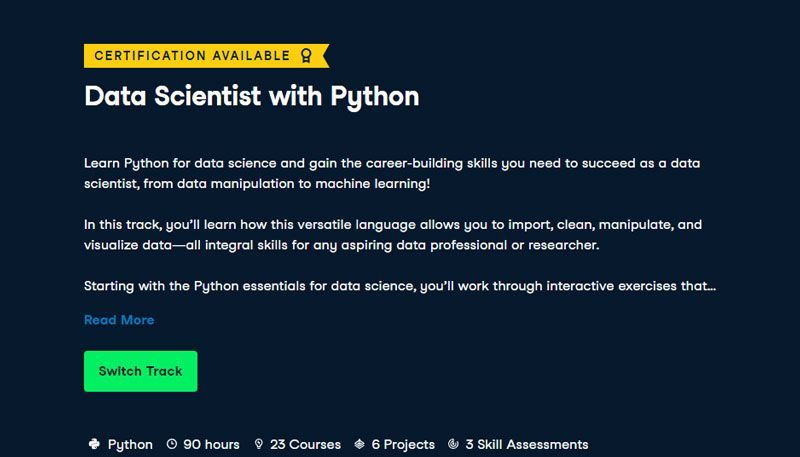
The Data Scientist track aims to equip learners with the skills to analyze, model, and interpret complex datasets using advanced techniques and tools.
Course structure and content
The Data Scientist track follows a similar structure to the Data Analyst track, with courses progressing from foundational concepts to more advanced topics. The courses cover essential skills like data manipulation, visualization, machine learning, and statistical modeling. In addition, I appreciated the real-world examples and case studies included in the courses, which helped me see the practical applications of the techniques I was learning.
Financing options
Like the Data Analyst track, the Data Scientist track is included in DataCamp's subscription plan, making it a cost-effective option for learners looking to build a comprehensive skill set in data science.
Prerequisites and getting started
The Data Scientist track is suitable for learners with prior experience in programming and data analysis, although it starts with introductory courses in R, Python, or SQL. A solid foundation in statistics and mathematics is also helpful for understanding the more advanced topics covered in this track.
Python Programmer
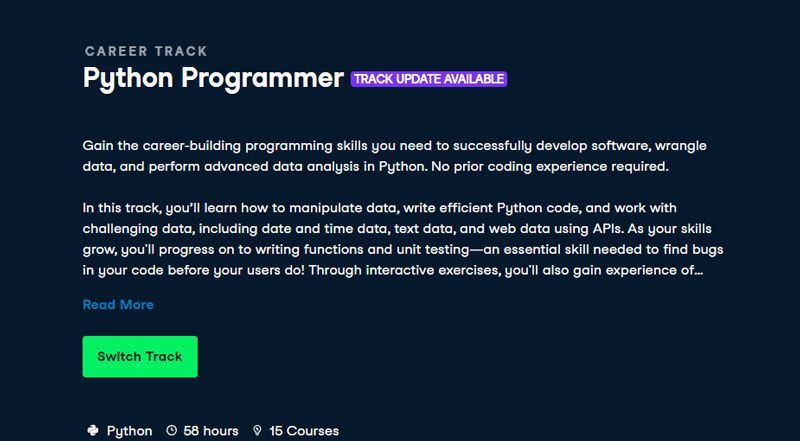
The Python Programmer track focuses on building proficiency in Python programming for data analysis, web development, and automation.
Course structure and content
This track consists of courses covering essential Python programming concepts, libraries, and tools. The courses start with basic programming principles and introduce more advanced topics like web scraping, API interactions, and data visualization. The hands-on coding exercises and projects were particularly helpful in reinforcing my understanding of Python.
Financing options
As with other tracks on DataCamp, the Python Programmer track is included in the subscription plan, making it an affordable option for learners seeking to specialize in Python programming.
Prerequisites and getting started
The Python Programmer track is designed for learners with little to no prior programming experience. The track starts with an introductory course that covers the basics of Python syntax and programming concepts, allowing learners to build a strong foundation before progressing to more advanced topics.
DataCamp Certification Programs
DataCamp offers certification programs for learners who wish to demonstrate their proficiency in specific data science and analytics skills. These programs typically involve completing courses and passing a final assessment. Upon successful completion, learners receive a verified certificate that can be showcased on their professional profiles, such as LinkedIn.
DataCamp for Business
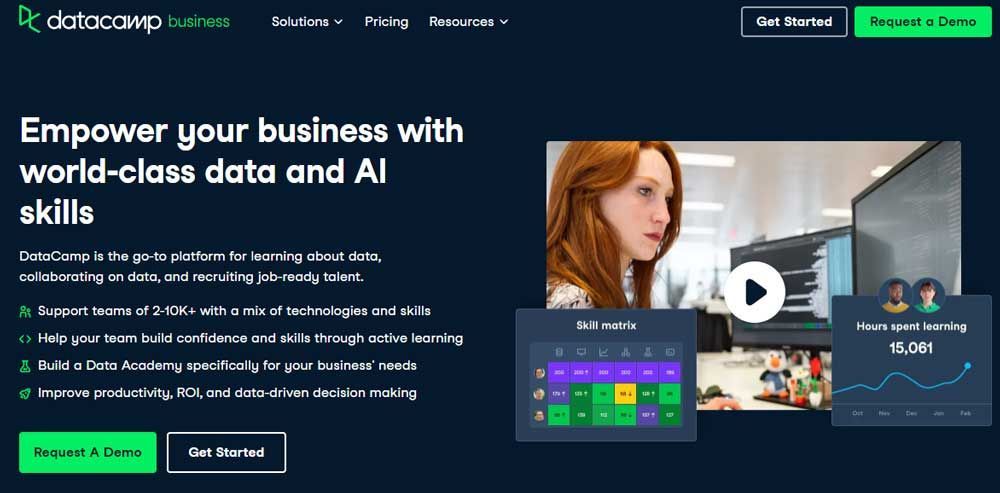
DataCamp for Business is a tailored solution to help organizations upskill their teams in data science, machine learning, and analytics. With features like team progress tracking, customized learning paths, and hands-on projects, DataCamp for Business provides a comprehensive and flexible learning environment to address the specific needs of organizations and their employees.
DataCamp for the Classroom
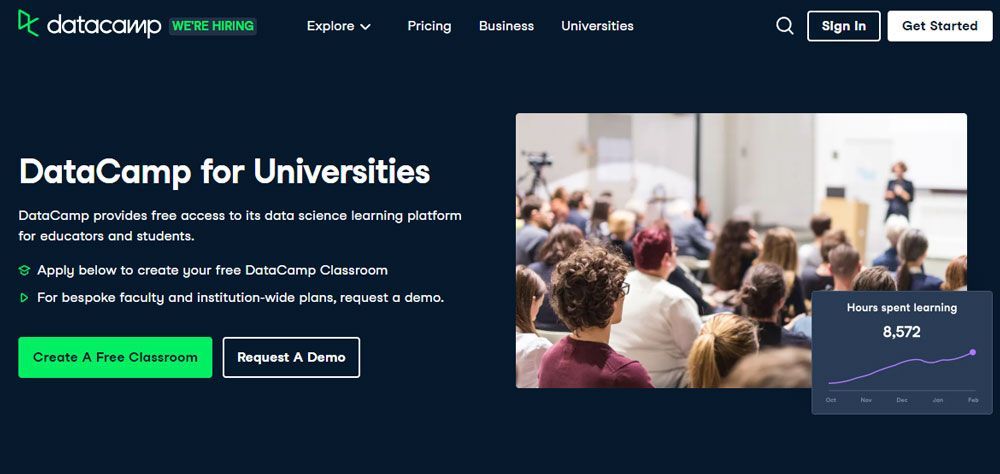
DataCamp for the Classroom is an initiative that offers free access to DataCamp's course library for educators and their students. This program aims to support academic institutions' data science and analytics education by providing high-quality, interactive learning resources that can be easily integrated into existing curricula. As a learner, I've seen firsthand the value of DataCamp's courses and believe that this initiative can significantly enhance the learning experience for students in data-related fields.
Pricing and Subscription Plans
In this section, I'll discuss DataCamp's pricing and subscription plans based on my experience as a subscriber. DataCamp offers clear pricing plans, making it easy for learners to understand the costs and benefits associated with their subscriptions.
| Basic | Premium | Teams | Enterprise | |
|---|---|---|---|---|
| Monthly Cost | Free | $39/month | NA | Contact Sales |
| Monthly Cost if Paid Yearly | Free | $25/month | $25/month | Contact Sales |
Clear pricing plans
DataCamp offers two main subscription plans: Basic and Premium. The Basic plan provides access to most of DataCamp's course library, including all individual courses, learning tracks, and skill assessments. The Premium plan includes everything in the Basic plan and access to additional resources like instructor-led live sessions, projects, and priority support.
Both plans are available monthly or annually, with the annual option offering significant savings compared to the monthly rate. Additionally, the pricing was reasonable, considering the quality and breadth of content available on the platform.
Discounts and financial assistance
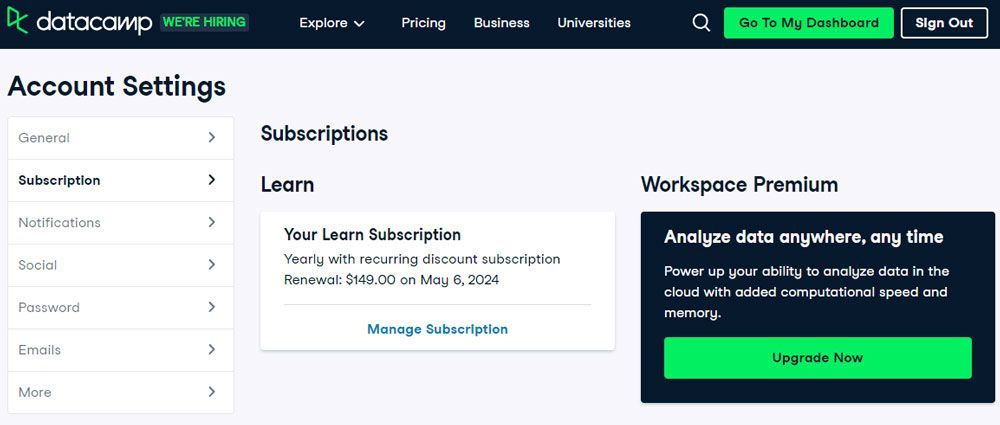
As you can see in the image above, I have only paid $149 for a full year of DataCamp usage. This price that I got at such a big discount, gets locked in on renewals as well, making it even more worth it.
DataCamp occasionally offers discounts and promotions for new subscribers, which can further reduce the subscription cost. Additionally, the platform provides free access to their "Introduction to Data Science" courses and the first chapters of all other courses, allowing learners to explore the content before committing to a subscription.
For educators and students, DataCamp offers the "DataCamp for the Classroom" initiative, which provides free access to the platform's course library. This program supports data science education in academic institutions and helps students develop critical data skills without financial barriers.
DataCamp's transparent pricing and subscription plans cater to various budgets and needs. The platform also makes an effort to provide financial assistance and discounts to ensure that learners from various backgrounds can access high-quality content.
Creating and Managing a DataCamp Account
As a DataCamp user, creating and managing an account on the platform is straightforward. In this section, I'll share my insights on setting up an account, customizing your learning experience, and tracking progress and achievements.
Account setup and customization
To create a DataCamp account, you only need an email address, a password, and a few minutes of your time. You can also sign up using your Google, Facebook, or LinkedIn account, simplifying the process further. Once your account is created, you can immediately start exploring the courses and learning paths available on the platform.
DataCamp will ask you to complete a brief questionnaire about your background, interests, and learning goals during the account setup process. This information helps the platform tailor your learning experience by recommending relevant courses and learning paths based on your preferences. This feature was helpful, allowing me to focus on the content that aligned with my specific goals and objectives.
Tracking progress and achievements
One of the strengths of DataCamp is its robust progress tracking and achievements system. As you complete courses and assessments, the platform keeps track of your progress, allowing you to monitor your learning journey easily. In addition, you can view your progress on your dashboard, which visually represents your accomplishments and helps you identify areas where you may need to improve.
In addition to tracking your progress through individual courses, DataCamp also awards experience points (XP) for completing exercises and challenges. This gamification aspect encourages continuous learning and adds fun and competition to the platform.
Finally, DataCamp provides certificates of completion for each course you finish. These certificates can be shared on your professional profiles or downloaded for your records, helping you showcase your newly acquired skills to potential employers or clients.
In conclusion, creating and managing a DataCamp account is a user-friendly experience that allows you to customize your learning path, track your progress, and celebrate your achievements as you advance in your data science journey.
Examples of the Most Popular DataCamp Courses
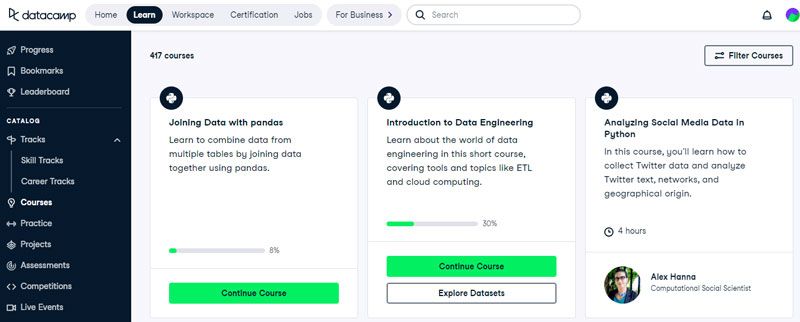
Based on my experience with DataCamp, I'd like to share some examples of the most popular courses on the platform. Learners rated these courses highly and covered various topics, ensuring there was something for everyone. Currently there are 417 courses on DataCamp.
Course highlights and descriptions
- Introduction to Python: This beginner-friendly course provides a comprehensive introduction to Python programming, one of the most widely-used languages in data science. Through interactive exercises and real-world examples, learners will gain a solid foundation in Python and learn how to manipulate data, create visualizations, and automate tasks.
- Data Science and Machine Learning Bootcamp with R: This course offers an in-depth introduction to data science and machine learning using R, a popular language for statistical computing. Learners will explore data manipulation, visualization, modeling techniques, and machine learning algorithms like linear regression, decision trees, and clustering.
- Data Wrangling with Pandas: In this intermediate-level course, learners will master the powerful Pandas library for data manipulation and analysis in Python. Topics covered include data cleaning, aggregation, merging, and reshaping, essential skills for any data professional.
- SQL Fundamentals: This course introduces the basics of SQL, a must-know language for working with databases. Learners will gain hands-on experience querying, filtering, and aggregating data using SQL and learn best practices for efficient database management.
Tips for Selecting the Perfect DataCamp Course
Selecting the right DataCamp course can be crucial to achieving your learning goals. Here are some tips to help you make the best choice based on my experience with the platform.
Assessing your current skill level
Before diving into a course, assessing your current skill level and knowledge is essential. DataCamp offers skill assessments that can help you gauge your proficiency in various topics and identify areas for improvement. This will ensure you choose a course that aligns with your current abilities and provides an appropriate challenge.
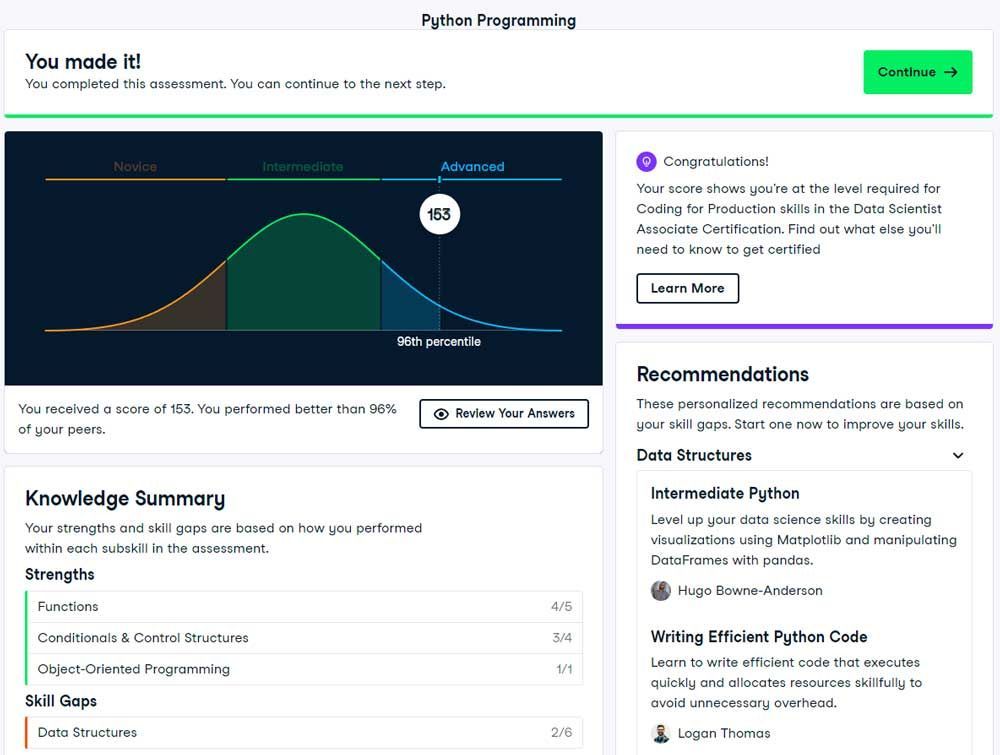
As you can see from the screenshot above, according to DataCamp, I'm fairly ok in Python programming. The platform give you a breakdown of how well you performed compared to others on the platform. It also shows you your weaknesses so that you know where to focus on to improve your skills and knowledge.
Identifying your career goals and interests
A clear understanding of your career goals and interests is crucial when selecting a course. Next, consider the skills and knowledge needed to achieve your objectives and choose courses that align with those requirements. DataCamp offers learning paths to guide you through courses tailored to specific job roles, such as data analyst or machine learning engineer.
Researching course content and reviews
Before committing to a course, take the time to research its content and read reviews from other learners. This will better understand what to expect and help you determine if the course meets your needs and expectations. In addition, most DataCamp courses offer a free preview of the first chapter, which can be an excellent way to assess the content and teaching style before subscribing.
By following these tips and thoroughly evaluating your options, you'll be better equipped to select the perfect DataCamp course for your learning goals and interests.
DataCamp Jobs Board and Career Profile
DataCamp offers more than just courses to help you learn data science; they also provide resources to support your career advancement. One such feature is the DataCamp Jobs Board and Career Profile, designed to connect learners with job opportunities and showcase their achievements.
Job Board
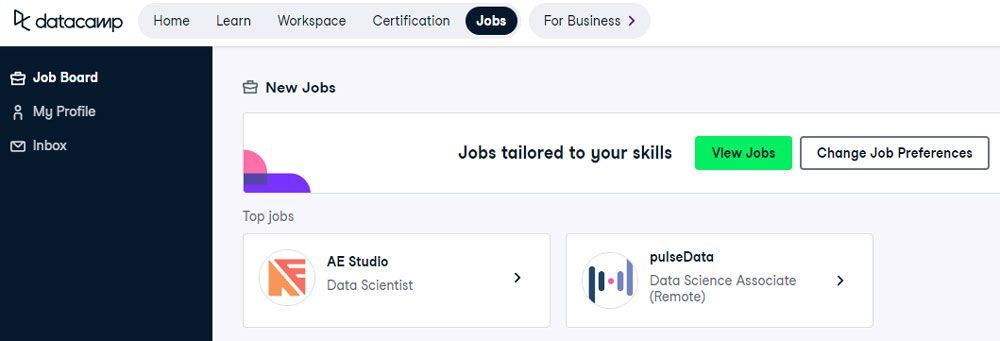
The DataCamp Job Board is a platform where employers post job openings tailored to data science professionals. This feature allows learners to browse and apply for positions that match their skills and interests, providing an invaluable resource for finding employment in the data science field.
Some of the benefits of the DataCamp Job Board include:
- Access to a curated selection of job postings relevant to data science
- The ability to filter job listings based on location, job title, and experience level
- Integration with your DataCamp Career Profile to streamline the application process
My Profile
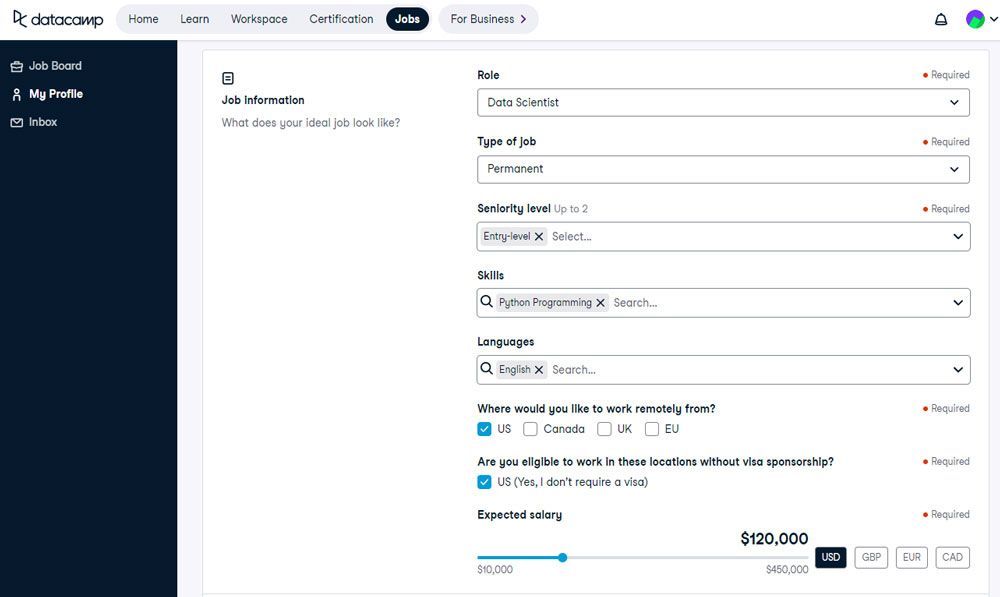
The "My Profile" section on DataCamp is designed to help you showcase your achievements and demonstrate your skills to potential employers. This personalized profile includes the following:
- A summary of your DataCamp courses completed, skill assessments, and project work
- A visual representation of your learning progress, with skill levels and areas of expertise highlighted
- Options to add a professional photo, personal bio, and social media or GitHub links
By building a comprehensive and attractive profile, you can effectively communicate your value to prospective employers and increase your chances of landing a job in the data science field.
Inbox
The "Inbox" feature on DataCamp serves as a communication hub, connecting you with potential employers and DataCamp support. Here, you can:
- Receive messages from employers interested in your profile
- Get updates on job applications and interview requests
- Access personalized feedback and support from DataCamp's career services team
The DataCamp Jobs Board and Career Profile, with its job listings, personalized profile, and communication hub, provides a comprehensive toolkit to support your career growth in data science. By leveraging these features, you can enhance your job search and increase your chances of securing a rewarding position in the field.
DataCamp Alumni Outcomes and Success Stories
As a DataCamp user, I've encountered numerous success stories from alums who have benefited from the platform's courses and learning paths. In this section, I'll share some insights into the real-life experiences of DataCamp learners and how the platform has contributed to their career growth.
Real-life experiences and testimonials
DataCamp alums frequently share their positive experiences with the platform, highlighting the engaging course content, knowledgeable instructors, and practical, hands-on exercises. In addition, many learners emphasize the value of DataCamp's project-based approach, which allows them to apply the skills they've learned to real-world scenarios and build a portfolio of work to showcase to potential employers.
Career transitions and advancements
DataCamp has played a significant role in helping learners transition into new careers or advance in their current roles. By providing in-depth, practical courses and learning paths tailored to specific job roles, DataCamp equips learners with the skills and knowledge needed to succeed in the data science field. Alum success stories often mention job promotions, new opportunities, and increased confidence in their data skills due to completing DataCamp courses.
DataCamp's Legitimacy and Credibility
DataCamp has established itself as a reputable and reliable platform for learning data science skills. This section will discuss the platform's accreditation, industry recognition, and how it compares to other learning platforms.
Accreditation and industry recognition
While DataCamp does not offer formal accreditation, its courses are developed and taught by industry experts, ensuring the content is relevant, up-to-date, and aligned with current industry trends. As a result, the platform is widely recognized within the data science community, and employers often value its course completion certificates as a demonstration of a learner's commitment to developing their skills.
Comparing DataCamp with other platforms
Several online learning platforms are available for data science, each with strengths and weaknesses. In this section, I'll compare DataCamp with one of its popular competitors,
Codecademy.
DataCamp vs. Codecademy
Both DataCamp and Codecademy offer interactive, hands-on learning experiences for data science topics. However, there are some key differences between the two platforms:
- Focus: DataCamp focuses exclusively on data science and related fields, while Codecademy offers a broader range of programming and technology courses. This specialization allows DataCamp to provide more in-depth and comprehensive content for data science learners.
- Course offerings: DataCamp offers a more extensive library of data science courses, including R, Python, SQL, machine learning, and data visualization. In contrast, Codecademy's data science courses primarily cover Python and SQL, with a more limited selection of advanced topics.
- Learning paths and career tracks: DataCamp offers structured learning paths tailored to specific job roles, such as data analyst, data scientist, and machine learning engineer. Codecademy also provides career paths but focuses more on general programming skills than data science-specific roles.
In summary, DataCamp's alum outcomes and success stories demonstrate the platform's ability to help learners achieve their career goals in data science. In addition, its industry recognition and comparison with other online learning platforms further reinforce the platform's legitimacy and credibility.
Pros and Cons of DataCamp
As an experienced DataCamp user, I've had the opportunity to explore the platform's various features and courses. In this section, I'll share some of the advantages and unique aspects of DataCamp and the limitations and areas where the platform could improve.
Advantages and unique features
DataCamp offers several benefits that set it apart from other online learning platforms, particularly for learners interested in data science and related fields.
Wide range of courses and topics
One of the key advantages of DataCamp is its extensive library of courses covering various topics in data science, including programming languages such as R, Python, and SQL, as well as machine learning, data visualization, and more. This wide range of offerings enables learners to develop a comprehensive skillset and explore specialized areas of interest in data science.
Limitations and areas for improvement
One of the key advantages of DataCamp is its extensive library of courses covering various topics in data science, including programming languages such as R, Python, and SQL, as well as machine learning, data visualization, and more. This wide range of offerings enables learners to develop a comprehensive skillset and explore specialized areas of interest in data science.
Not a verified certificate
While DataCamp provides completion certificates for its courses, they are not formally accredited or verified by an external organization. This may impact the perceived value of the certificates among some employers or educational institutions.
Video content lacking detail
Some users have reported that the video content in DataCamp courses can be too brief or lacking in detail. While this might be fine for some, learners who prefer more in-depth explanations or visual demonstrations may find this aspect of the platform challenging.
Limited interaction
DataCamp courses primarily consist of interactive exercises and video content, with limited opportunities for interaction with instructors or other learners. While the platform does have a community forum where users can ask questions and share insights, some learners may miss the more direct communication and feedback opportunities provided by in-person or live online courses.
In summary, DataCamp offers various courses and topics catering to learners interested in data science. Still, it has some limitations, such as more verified certificates, brief video content, and limited interaction opportunities. Understanding these pros and cons can help prospective learners decide whether DataCamp is the right platform to meet their learning needs and preferences.
Ideal user-profiles and recommendations
DataCamp is particularly well-suited for individuals who:
- Are you interested in learning data science or improving your skills in this field
- Prefer a self-paced, interactive learning experience with hands-on exercises
- Want access to a wide range of courses and topics within data science
If you fit any of these profiles, DataCamp is a worthwhile investment. The platform's comprehensive course library, engaging learning experience, and career-focused learning paths can help you build the skills needed to succeed in the data science field.
Exploring alternative resources and platforms
While DataCamp is an excellent platform for many learners, it's always a good idea to explore other options and compare them to find the best fit for your needs. Some alternative online learning platforms that offer data science and technology courses include:
edX Review
edX is an online learning platform founded by Harvard University and MIT that offers a wide range of courses from top universities and institutions. While its data science offerings are less extensive than DataCamp's,
edX provides more in-depth and academically rigorous courses, some of which offer verified certificates and university credits.
Udacity Review
Udacity is an online learning platform focusing on technology and programming courses, including data science. Udacity's unique selling point is its Nanodegree programs, which are comprehensive, project-based learning experiences designed in collaboration with industry partners. These programs often include personalized feedback, mentor support, and career guidance.
Pluralsight Review
Pluralsight is an online learning platform that offers a wide range of technology and programming courses, including data science topics. Pluralsight's strength lies in its extensive course library and the depth of its content, which caters to learners of various skill levels. While it does not offer the same level of interactivity as DataCamp, Pluralsight is known for its high-quality video content and expert instructors.
Final Verdict: Is DataCamp Worth the Investment?
After using DataCamp extensively and evaluating its offerings, I believe it's a valuable platform for learners interested in data science and related fields. In this section, I'll share my thoughts on the ideal user profiles for DataCamp and provide recommendations for those considering the platform. Additionally, I'll briefly discuss alternative resources and platforms for those seeking other options.
In conclusion, DataCamp is a worthwhile investment for many learners interested in data science and related fields, offering a wide range of courses, an engaging learning experience, and practical, hands-on exercises. However, it's essential to consider your unique needs and preferences when selecting a platform and to explore alternative options to find the best fit for your learning journey.
Pros
- Comprehensive Course Offerings: DataCamp provides an extensive range of courses covering various data science topics, including programming languages, machine learning, data visualization, and more. This makes it an excellent one-stop shop for data science enthusiasts and professionals.
- Interactive Learning: DataCamp's hands-on learning approach, with its coding exercises and real-world projects, helps learners quickly apply their new knowledge and skills, promoting better retention and practical understanding.
- Expert Instructors: DataCamp's courses are designed and taught by industry professionals and experienced educators, ensuring the content is relevant, engaging, and up-to-date.
- Flexible Learning: DataCamp offers a self-paced learning structure, allowing you to learn quickly and on your schedule. This makes it convenient for busy learners or learners who prefer to set their own pace.
- Affordable Pricing: DataCamp's subscription plans are reasonably priced, making it an accessible platform for individuals looking to invest in their data science education.
Cons
- Limited Course Depth: While DataCamp offers a wide range of courses, some learners might find that the depth of the content could be more comprehensive than that provided by more specialized or advanced platforms.
- Certificates: Although DataCamp provides completion certificates, they might not be as highly regarded by employers as certificates from more established institutions.
Despite the few drawbacks, DataCamp is a valuable platform for those interested in data science. With its comprehensive course offerings, interactive learning experience, expert instructors, flexible learning structure, and affordable pricing, DataCamp is an excellent investment for individuals looking to develop their data science skills or kickstart a career.
SkillEvolver Review Methodology
SkillEvolver.com follows a rigorous
methodology to create transparent, high-quality reviews of online learning platforms and financial products. Our team consists of professionals with extensive experience in these fields. We prioritize reader interests, test products under real-world conditions, and regularly update our content. Our reviews cover categories such as customer support, usability, and certificates. Adhering to a strict code of conduct, we ensure honesty and transparency in our content, making SkillEvolver.com a trustworthy source for reviews and information.

Empowering professional growth through innovative learning and comprehensive resources for skill development and career advancement.
QUICK LINKS
SECTIONS
Career Evolver
Personal Evolver
Mentality Evolver
